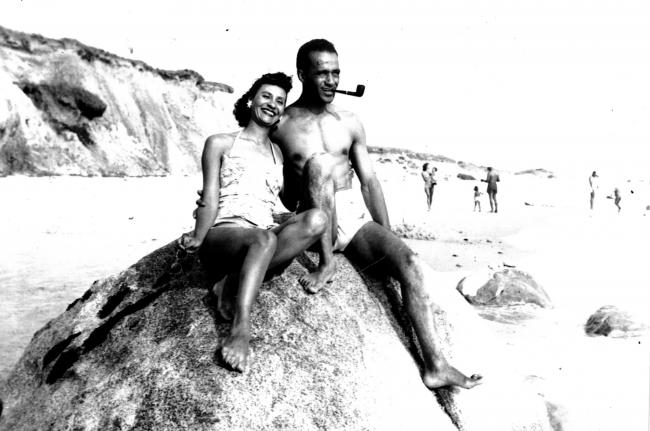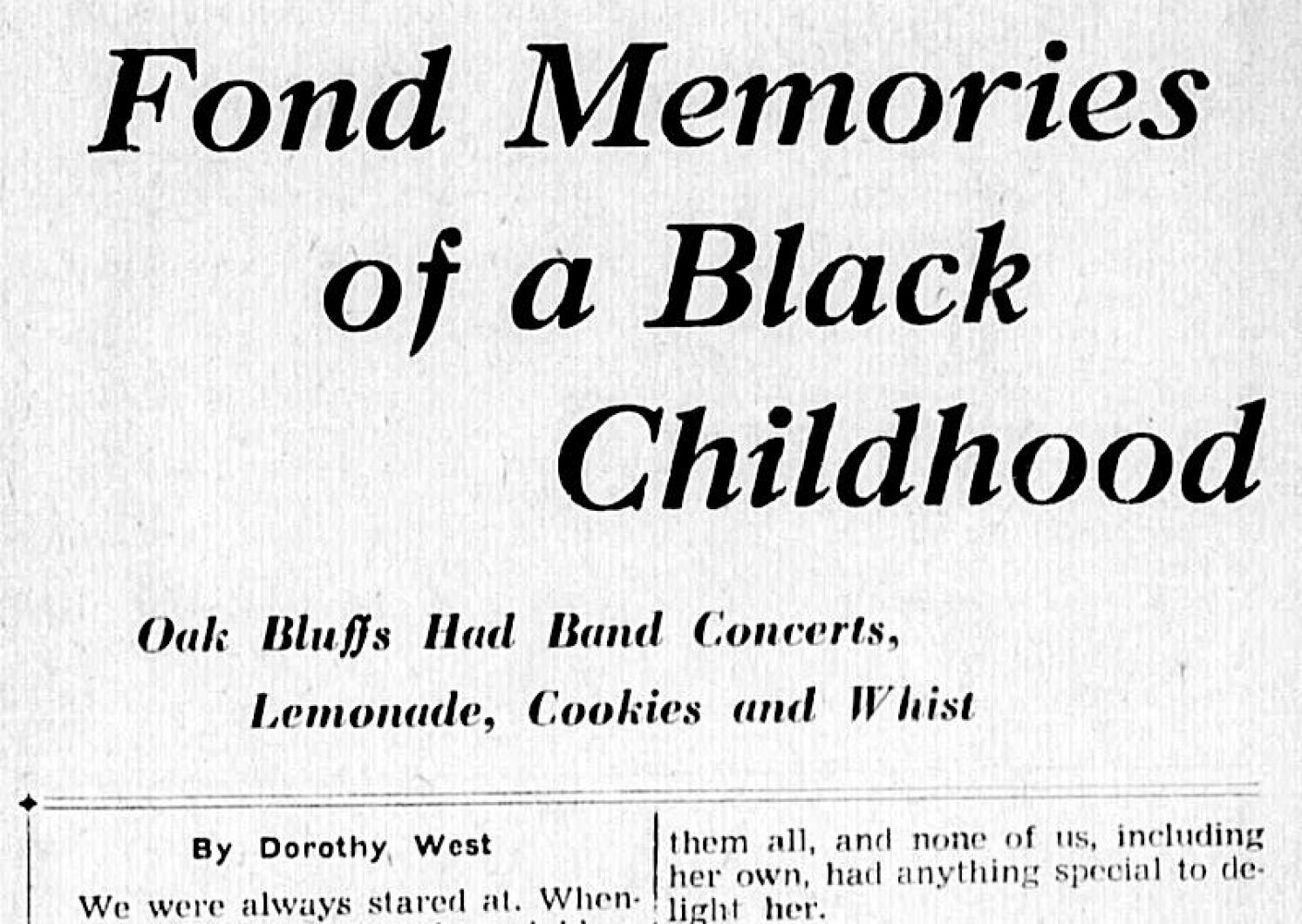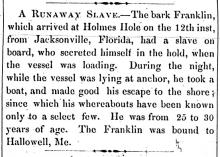We were always stared at. Whenever we went outside the neighborhood that knew us, we were inspected like specimens under glass. My mother prepared us. As she marched us down our front stairs, she would say what our smiles were on tiptoe to hear, “Come on, children, let’s go out and drive the white folks crazy.”
She said it without rancor, and she said it in that outrageous way to make us laugh. She was easing our entry into a world that outranked us and outnumbered us. If she could not help us see ourselves with the humor, however wry, that gives the heart its grace, she would never have forgiven herself for letting our spirits be crushed before we had learned to sheathe them with pride.
When the Ipswich street trolley screeched to a halt at our car stop, we scrambled abroad and sat in a row on the long seat at one end of the trolley that must have been designed for mothers with broods to keep together. We were thereby in full view. For the rest of that trolley ride into town, we were in our infinite variety, a total divertissement.
Even my mother on occasion called our family a motley crew. We did not have pointed heads. We were simply a family that ranged in color from the blond child to me, a whim of God’s that had gone on over so many generations that we had long since grown accustomed to accepting whatever gift we got. In a world where order is preferred, we were not uniform.
Did Not Seem Odd
That my mother appeared to highlight the difference by dressing the blond child and me alike did not seem odd to me then, and is now too long ago to seem any odder than anything else that happened in my family. Whether she did it to further confound outsiders or because she was genuinely charmed by pairing the fairest and darkest was no more a cosmic prank on her part than on his.
We were a tribal family, living under a shared roof because that was the way we liked it. My mother was chief mother because nobody challenged her. Her oldest sister, who should have been chief mother, had raised so many of my grandmother’s batches of babies that by the time we came along, she had seen enough children to have seen them all, and none of us, including her own, had anything special to delight her.
We gave her the honor that was due her as the senior sister. She carried herself above reproach. She never told lies and was a true Christian. She went to church rain or shine and visited the sick. She read the Bible and could quote it. She gave counsel when asked for it, and was never wrong. We were all in awe of her, even my irreverent mother. She was the soul of starched dignity. We often felt unworthy beside her.
We were right to feel unworthy. She would not sit at a table with us because we ate too much and upset her digestion. My mother had to take a tray to her in the parlor. If we went to the movies together, she would sit in a different row, so that she would not have to be part of all that candy crunching and reading the titles aloud.
When it was time to go away for the summer and my mother packed a shoebox with sandwiches which we steadily ate between South Station and Woods Hole, that was the time my aunt could have said, “Off with their heads,” without thinking twice.
Black Bostonians
We were black Bostonians on a train full of white ones. Because we were obviously going the same way, laden as we were with all the equipment of a long holiday, children, luggage, last minute things stuffed in paper bags, a protesting cat in a carton, in addition to the usual battery of disbelieving eyes, we were being subjected to intense speculation as to what people with our unimpressive ancestry were doing on a train that was carrying people with real credentials to a summer sojourn that was theirs by right of birth.
We were among the first blacks to vacation on Martha’s Vineyard. It is not unlikely that the Island, in particular Oak Bluffs, had a larger number of vacationing blacks than any other section of the country.
There were probably 12 cottage owners. To us it was an agreeable number. There were enough of us to put down roots, to stake our claim to a summer place, so that the children who came after us would take for granted a style of living that we were learning in stages.
The early blacks were all Bostonians, which is to say they were neither arrogant nor obsequious, they neither overacted nor played ostrich. Though the word was unknown then in today’s connotation, they were “cool”. It was a common condition of black Bostonians. They were taught very young to take the white man in stride or drown in their own despair. Their survival was proved by their presence on the Island in pursuit of the same goal of happiness.
Every day, the young mothers took their children to a lovely stretch of beach and scattered along it in little pools. They made a point of not bunching together. They did not want the whites to think they knew their place.
There was not much exchange except smiles between the new and the old, no more was needed. Bostonians do not rush into relationships. Sometimes the children took their shovels and pails and built castles together. It was a pretty scene. The blacks in all their beautiful colors, pink and gold and brown and ebony. The whites in summer’s bronze.
The days were full. There were berries to pick, a morning’s adventure. There were band concerts for an evening’s stroll. There were invitations to lemonade and cookies and whist. There was always an afternoon boat to meet, not so much to see who was getting off, but to see and talk to whatever friends had come for that same purpose.
Black New Yorkers
For some years the black Bostonians, growing in modest numbers, had this idyll to themselves. The flaws were put in perspective because no place is perfection.
And then came the black New Yorkers. They had found a fair land where equality was a working phrase. They joyously tested it. They behaved like New Yorkers because they were not Bostonians. There is nobody like a Bostonian except a man who is one.
The New Yorkers did not talk in low voices. They talked in happy voices. They carried baskets of food to the beach to make the day last. They carried liquor of the best brands. They grouped together in an ever increasing circle because what was the sense of sitting apart.
Their women wore diamonds when the few Bostonians who owned any had left theirs at home. They wore paint and powder when in Boston only a sporting woman bedecked her face in such bold attire. Their dresses were cut low. They wore high heels on sandy roads.
I had a young aunt who would duck behind a hedge and put us children on watch while she rubbed her nose with a chamois when we told her it was shiny. We did not think her performance was unusual. It was the New Yorkers who seemed bizarre, who always seemed to be showing off wherever they gathered together.
The New Yorkers were moving with the times. They had come from a city where they had to shout to be heard. It was a city that offered much, judgeships, professorships, appointments to boards, stardom on stage and more. Whoever wanted them had to push. The New Yorkers wanted them. They were achievers. They worked hard and they played hard.
They would unwind in another generation. They would cine to the Island to relax not to race. They would come to acknowledge that the Bostonians had a certain excellence that was as solid an achievement as money.
But in the meantime they lost the beach for the Bostonians. That beach like no other, that tranquil spot at that tranquil end of the Island. All one summer the Bostonians saw it coming like a wave they could not roll back. It came the next summer. The beach became a private club, with a gate that only dogs could crawl under, and a sign that said, “For members only”.
You lose some, and by the same token, you win some. The world was not lost, just a piece of it. And in the intervening years more has been gained than was ever forfeited, more has been fought for and won, more doors have opened as fewer have closed.
Harry T. Burleigh, the composer, who left a priceless legacy in his long research of Negro spirituals - those shouts of grace and suffering and redemption that might have perished forever if he had not given his gifts to preserving them - he was the first to bring back glad tidings of the Island’s fair land to his New York friends, who had always thought of Massachusetts as a nice place to come from, but not to go to unless bound and gagged.
Mr. Burleigh had come to stay at Shearer Cottage in the Highlands, a quiet boarding house operated by Boston friends, who had recommended the seclusion of the lovely wooded area, where New York’s busy lights seemed as remote as the Island stars seemed near.
He was very good to the children of his friends. There were seven or eight of us who were his special favorites. He gave us money every time he saw us. We did not know any better than to spend it in once place. With abundant indulgence he gave us some more to spend in another. He rented cars and took us on tours of the Island. He told us about his trips abroad. To be with him was a learning experience.
There is a snapshot of him in a family album. Under the snapshot, in the handwriting of that aunt who could take us or leave us, there is the caption: H.T.B., the children’s friend. He was rich and well known in important circles at the time. There were a dozen glowing captions that would have applied. I think it is a tribute to him - and perhaps my aunt - that she chose this simple inscription.
Mr. Burleigh’s summers were spent working as well as sunning. Every weekday morning he went to a church in Vineyard Haven where he had use of the piano. Many of the spirituals sung around the world were given arrangements within God’s hearing in an Island church.
In the course of time, Mr. Burleigh grew to regret the increasing number of New Yorkers who brought their joyous living to his corner of the Highlands. He had extolled this sacred spot, and they were taking over. Who can say they did not share his vision? They simply expressed it in a different way.
Adam Clayton Powell Visits
Adam Clayton Powell came to summer at Shearer Cottage when he was a boy. He came with his father. His mother stayed home. Adam came to our house to play every day, and every day Adam’s father came to ask my mother if his son was somewhere around. We were sorry for Adam that a boy as big as he was had a father who was always following him around. I can see that great tall man, who looked so like Adam was to grow up to look, striding up the road to ask my mother in his mellifluous preacher’s voice if she had seen his boy. He would hold her in conversation, and she would turn pink as a rose. He seemed to make her nervous, and we didn’t know why. Sometimes he would come twice a day to see if Adam had lost his way between our house and Shearer Cottage. He never did, but all that summer his father couldn’t rest until he had seen for himself.
Judge Watson - the first black man elected to a judgeship in New York city - his wife, and their young children spent several summers on the Island. They were a splendid family. The younger members still return to see the friends of their childhood. They have all achieved much. Barbara Watson is assistant secretary of state for security and consular affairs, and the first woman to attain such rank. Grace Watson directs an HEW program for volunteers in education that encompasses nearly 2 million teaching aids across the country. Douglas Watson is an aeronautical engineer and chief project officer with Republic Aircraft in Jamaica, L. I. James is a judge in the U. S. Customs Court in Manhattan.
Though all of their titles are impressive, they have not changed. Like all who have come to the Island in the years of their innocence, something here has touched them with sweetness and simplicity.
The summer wound down to September. Labor Day came, cottages emptied. Ours stayed open. We were always late returning to school. My mother could not bear to leave. Fall was so lovely. Winter would be so long to wait to see an Oak Bluffs sky again.
We lingered for those magic days until my father wrote, as he wrote every year, “Come on home, there are no more flowers to pick.”
Then we packed our shoebox with sandwiches and left.





 6 comments
6 comments


Comments (6)
Comments